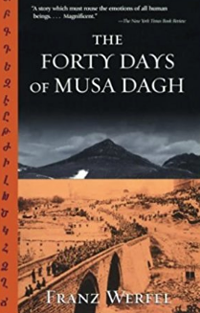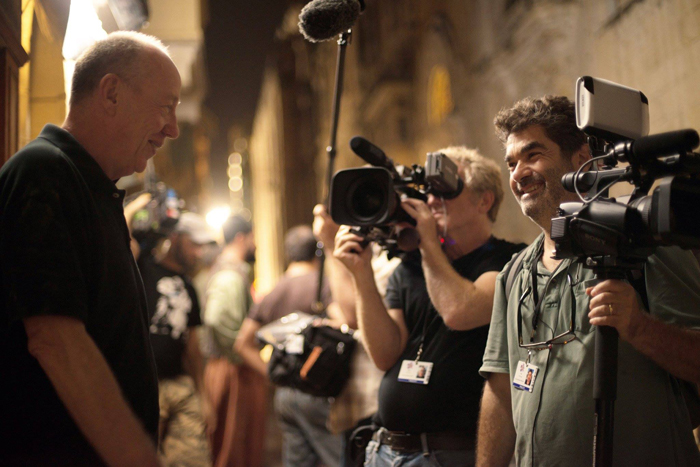
Intent to Destroy director Joe Berlinger (right) and his director of photography, Bob Richman (middle), with The Promise director Terry George (left). Photo property of Intent to Destroy Movie
In select theaters beginning November 10th including
Laemmle Playhouse, Los Angeles
Pacific Theatres, Glendale Village
East Cinemas, New York
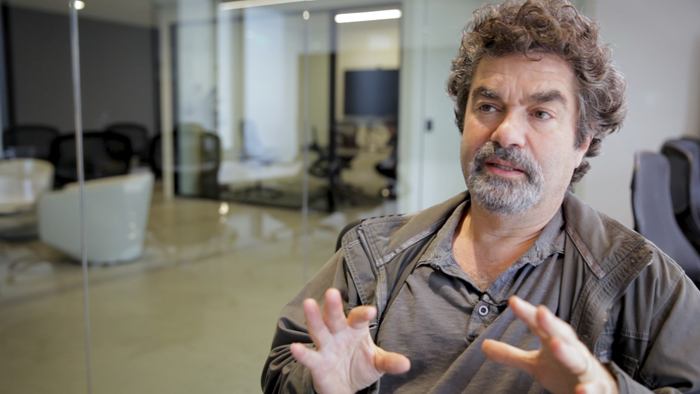
Watch the video interview on Youtube here
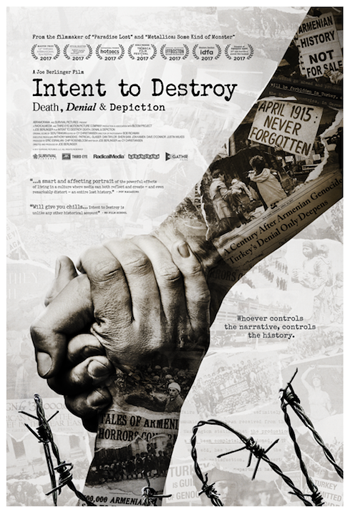
Film Courage: Joe when you started making [the documentary film] INTENT TO DESTROY, what was the question you were trying to answer?
Joe Berlinger: For years I’ve been fascinated by the Armenian Genocide and the fact that it’s contested history, you know? Because to me, the evidence is kind of overwhelming. And I was actually approached about making the film. Initially I was not interested in actually making it because I didn’t see a way to do it that would transcend talking heads and archival footage. Then when I heard THE PROMISE was being made, I thought that was a real opportunity to do something different as a filmmaker, but also to really add to the dialogue that is already out there about the Armenian Genocide. Because by going behind-the-scenes of THE PROMISE and using that as the present tense thread, it allowed me to make a film about denial and the aftermath of denial and the mechanism of denial. And those are the questions I wanted to address in this film.
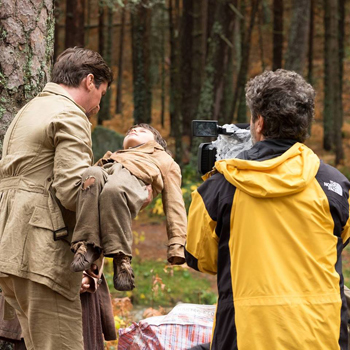
Of course, part of the film is to also tell the underlying history of the genocide because it’s history that (sadly) a lot of Americans, a lot of people all over the world actually, are unfamiliar with because of the successful attempt to kind of shove the story under the rug of history. But the ability to actually do it in a way that’s cinematically satisfying so that we can transcend talking heads and archival footage by going behind-the-scenes of a movie, a feature film, that was exciting to me. I wanted to talk about the denial aspect and going behind-the-scenes of a big-budget Hollywood movie is not just gratuitous device, it’s central to the story, which is why I thought there was an opportunity.
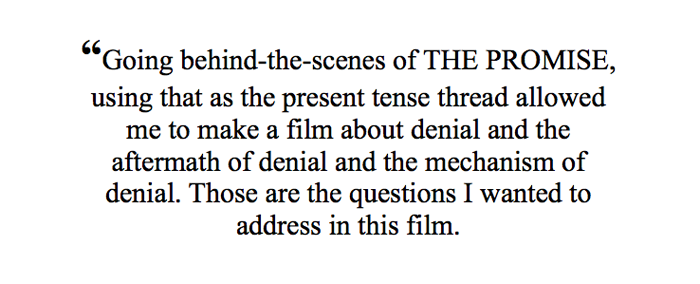
The opportunity to go behind-the-scenes of THE PROMISE to me represented a real…not just a great filmmaking device to allow me as a present tense cinéma vérité filmmaker (which is what I am more comfortable with), it gives me a present tense device to hang everything on. But I knew when I heard THE PROMISE was announced, it actually represented a historical moment because over the years any time Hollywood has attempted to make a movie that is Armenian Genocide-themed, the U.S. State Department gets a complaint from Turkey. They call the Hollywood studio and they’ve convinced over the years Hollywood not to tackle this story.

As early as 1935, Irving Thalberg at MGM was bringing the book The Forty Days of Musa Dagh to life, to the screen. And in pre-production, that movie was actually shut down because the Turks complained to the State Department and the State Department convinced MGM it wouldn’t be in their interest to make that movie.
So America has aided and abetted the denial of this story and one of the methods that this has happened is Hollywood itself, where it’s been almost taboo to make big-budget movies about this incredible historical event.
America has aided and abetted the denial of this story and one of the ways they’ve done it is by encouraging Hollywood not to tell these stories. You know, that would kind of be like pulling Steven Spielberg aside and saying “Hey, don’t make Schindler’s List. We need to keep the Germans happy.”
But that is what is going on with the Armenian Genocide. So you’ve never seen a big budget or even a small budget Hollywood…you’ve seen other filmmakers outside of the U.S. studio system tackle this, but you’ve never seen a mainstream Hollywood movie about the Armenian Genocide. So when I heard THE PROMISE was being made, which didn’t come from a studio, it’s still private money, but it was involving a lot of Hollywood players, Christian Bale, Oscar Isaac (from the acting standpoint). Mike Medavoy, a major Hollywood producer involved…Ralph Winter…(Watch the video interview on Youtube here).
About INTENT TO DESTROY (wording from official site here):
Pulling back the curtain on Genocide censorship in Hollywood due to U.S. government pressure to appease a strategic ally, Intent To Destroy embeds with a historic feature production as a springboard to explore the violent history of the Armenian Genocide and legacy of Turkish suppression and denial over the past century.
Joe Berlinger’s thirteenth feature documentary film captures the cinematic and political challenges of producing a historically meaningful, big-budget feature film in an environment rife with political suppression and threats of retaliation. In 2015, Academy Award-winning director Terry George (Hotel Rwanda, In the Name of the Father) took on the challenge of making the first mainstream film about the Armenian Genocide, despite previous failed attempts. Beginning production in 2015 on what George hopes will be the Armenian “Schindler’s List”, he directs The Promise, a sweeping World War I romantic drama set in the heart of the Ottoman Empire during the 1915 Armenian Genocide that wiped out 1.5 million Armenians. Provided unrestricted on-set access, Berlinger followed the production as it shot in Spain, Malta and Portugal, using the on-set behind-the-scenes experience as a lens to explore the reality and complexities of the actual Genocide and its subsequent denial.
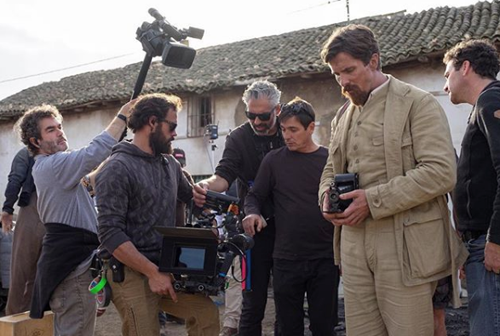
Berlinger juxtaposes evocative and beautifully shot scenes from the feature film with actual archival images from the period, along with present day interviews from a variety of experts, allowing the documentary to depict the reality of the atrocities carried out against the Armenians by the Ottoman Turks in a haunting and cinematic manner. Additionally, Berlinger uses the present-day film production to provide a framework for a systematic examination of a century of historical perversion by the Turks and those who have an interest in denying the Genocide. Turkish lobbying efforts have shuttered previous American film and literary productions that used the Armenian Genocide as a backdrop, making the release of The Promise the product of nearly 80 years of work and setbacks to bring this story to the big screen as a mainstream Hollywood production. Moreover, since the end of World War I, Turkey has successfully shaped international perception of what most historians consider the first genocide of the twentieth century, largely removing it from international consciousness through lobbying and threats of retaliation…(Read more here via Intenttodestroy.com).
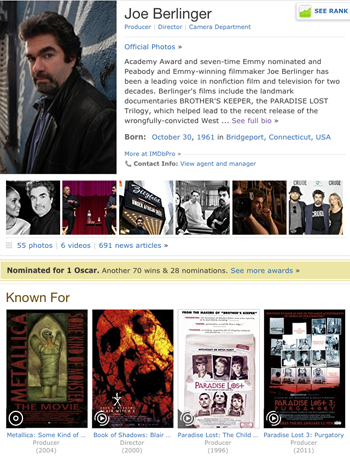
About Joe Berlinger:
Academy Award and seven-time Emmy nominated and Peabody and Emmy-winning filmmaker Joe Berlinger has been a leading voice in nonfiction film and television for two decades. Berlinger’s films include the landmark documentaries BROTHER’S KEEPER, the PARADISE LOST Trilogy, which helped lead to the recent release of the wrongfully-convicted West Memphis Three, and METALLICA: SOME KIND OF MONSTER, a film that re-defined the rockumentary genre. CRUDE, about oil pollution in the Amazon Rainforest, won 22 human rights, environmental and film festival awards and recently triggered a high profile First Amendment battle with oil-giant Chevron. Five of Berlinger’s documentary features, including his Emmy-nominated 2012 Paul Simon documentary UNDER AFRICAN SKIES, have premiered at the Sundance Film Festival, earning three Grand Jury Prize nominations. He has also received multiple awards from the Directors Guild of America, the National Board of Review and the Independent Spirit Awards.
CONNECT WITH ‘INTENT TO DESTROY
Intenttodestroy.com
Twitter
Thepromisetoact.org
CONNECT WITH JOE BERLINGER
Joeberlingerfilms.com
IMDB
Twitter
Instagram.com
Advertisement





